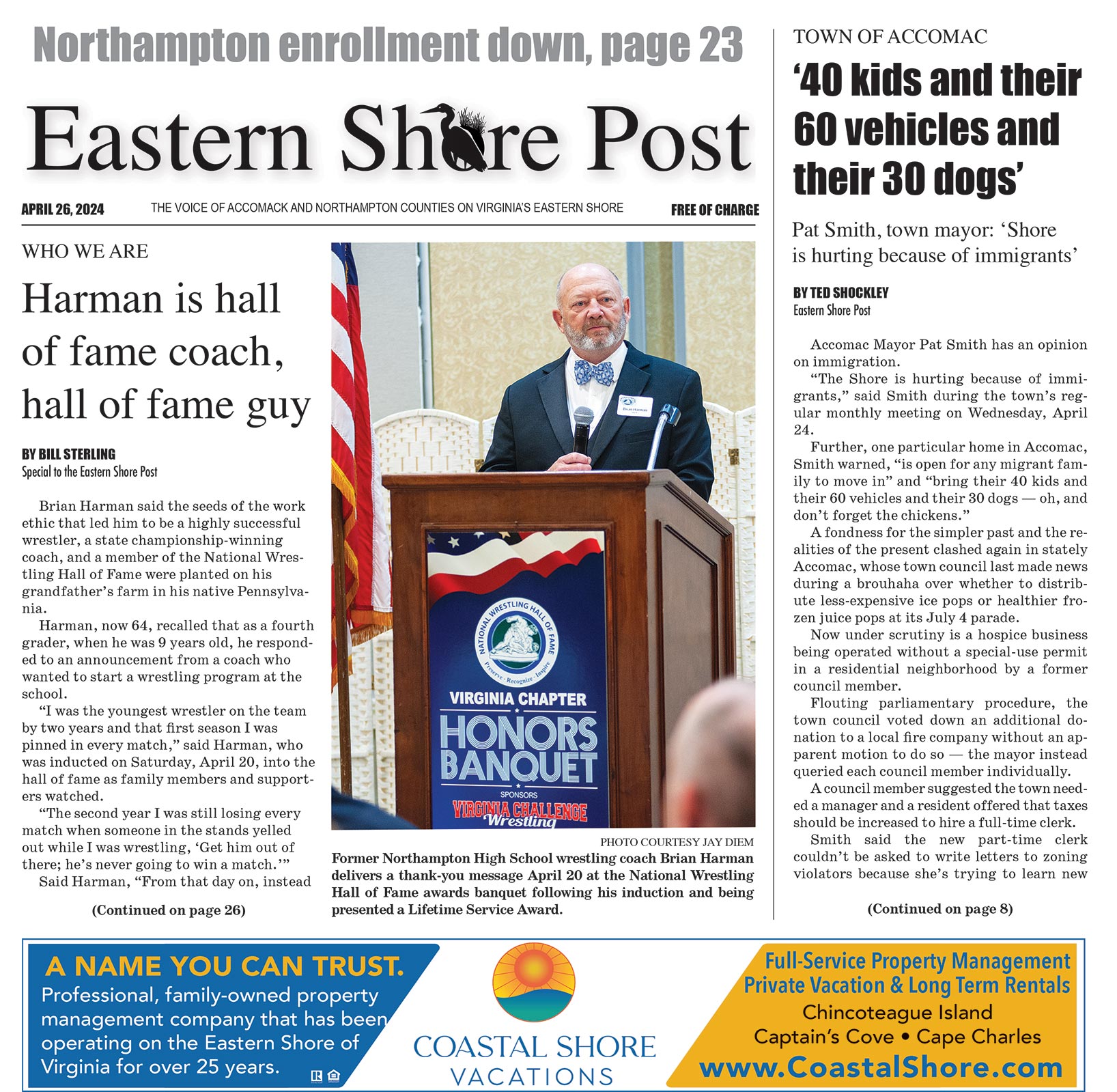
By Stefanie Jackson – Exmore continues to keep its options open for the future of its sewer system and the plant’s operation in an effort to get the best deal for the town’s citizens, who are largely from low-and-moderate-income households.
“We’ve got to get the best sewer deal we can get, because our people don’t have the disposable income to pay Onancock and Cape Charles prices,” Town Manager Robert Duer said Monday night.
About 57% of Exmore’s 1,460 residents live in low-and-moderate income households, around five percentage points higher than three years ago.
Director of Utilities Taylor Dukes said around 500 people in Exmore are from households earning less than $25,000 annually, including retirees receiving Social Security benefits.
A preliminary engineering report, or PER, recommended Exmore build and run a new sewer plant, but an offer from the Hampton Roads Sanitation District (HRSD) to own and operate the plant is still on the table.
The town would be responsible for any expansion of its sewer collection system if it accepts the offer.
Exmore is waiting for Ted Henifin, general manager of HRSD, to present an offer that includes the costs that would be paid by the town and its sewer customers.
“If he comes in cheaper than – or the same price – as running our own plant, it would be fool of us to tie our money up. … That’s why that option remains open,” Duer said.
If the HRSD offer is “favorable,” the Exmore town council will likely hold a closed session ahead of its Dec. 7 meeting to discuss the offer with Henifin.
Exmore has lost revenue during the COVID-19 pandemic, including late fees and interest on overdue utility bills, which the town could not collect during a utility cutoff ban put in place by the Virginia State Corporation Commission in March.
The ban expired Oct. 5, and nearly 50 Exmore water customers were due to have their water shut off the next day.
Most customers have had their water turned back on since the Oct. 6 shutoff date. Several moved out of town without notice, so Exmore won’t recover all the lost revenue, Duer said.
But starting this month, late fees and interest can be charged again.
As of the Nov. 2 town council meeting, an additional 147 customers had received notices that their water would be shut off within a week.
“We’re no longer a financial institution. We’ve got to have cash flow,” Duer said.
When Exmore’s sewer system is upgraded, it will cost the town $50,000 to $80,000 every month, for which the town will be responsible whether or not customers pay their bills, Duer said.
Town officials have stated that water and sewer bills should be put in the names of homeowners, not renters.
A water and sewer bill should be sent to the same person who receives the real estate tax bill for the property, Councilman Chase Sturgis clarified.
That would stop people from “skipping out of town owing quite a bit of money to the town, because they were renters,” Dukes said.
Exmore’s income from sewer service was about $3,200 less than it budgeted for the period of July to October. “We balance that budget with late fees, and we (couldn’t) collect the late fees,” Duer explained.
Other revenue streams also have slowed during the COVID-19 pandemic.
Exmore received meals taxes of nearly $128,000 from July to October 2019, but less than $110,000 during the same period of 2020. The town received nearly $111,000 in transient occupancy taxes from July to October 2019, but less than $82,000 during the same period of 2020.
But the town anticipated less revenue in fiscal year 2021 and wrote its budget accordingly. It also has limited spending, Duer said.
Exmore is preparing to apply in March for a $1 million Virginia Community Development Block Grant for its sewer project.
Two public hearings are required before the application can be submitted, which are tentatively scheduled at the beginning of the next two town council meetings, in December and January.
The resolution authorizing the town manager to submit the grant application states that funding for the sewer project includes $17,255,000 from the Virginia Clean Water Revolving Loan Fund, $4 million from the U.S. Department of Commerce Economic Development Administration (with a $1 million local match), and $8.5 million in U.S. Department of Agriculture Rural Development loan and grant funds.
The resolution was seconded and passed unanimously.


